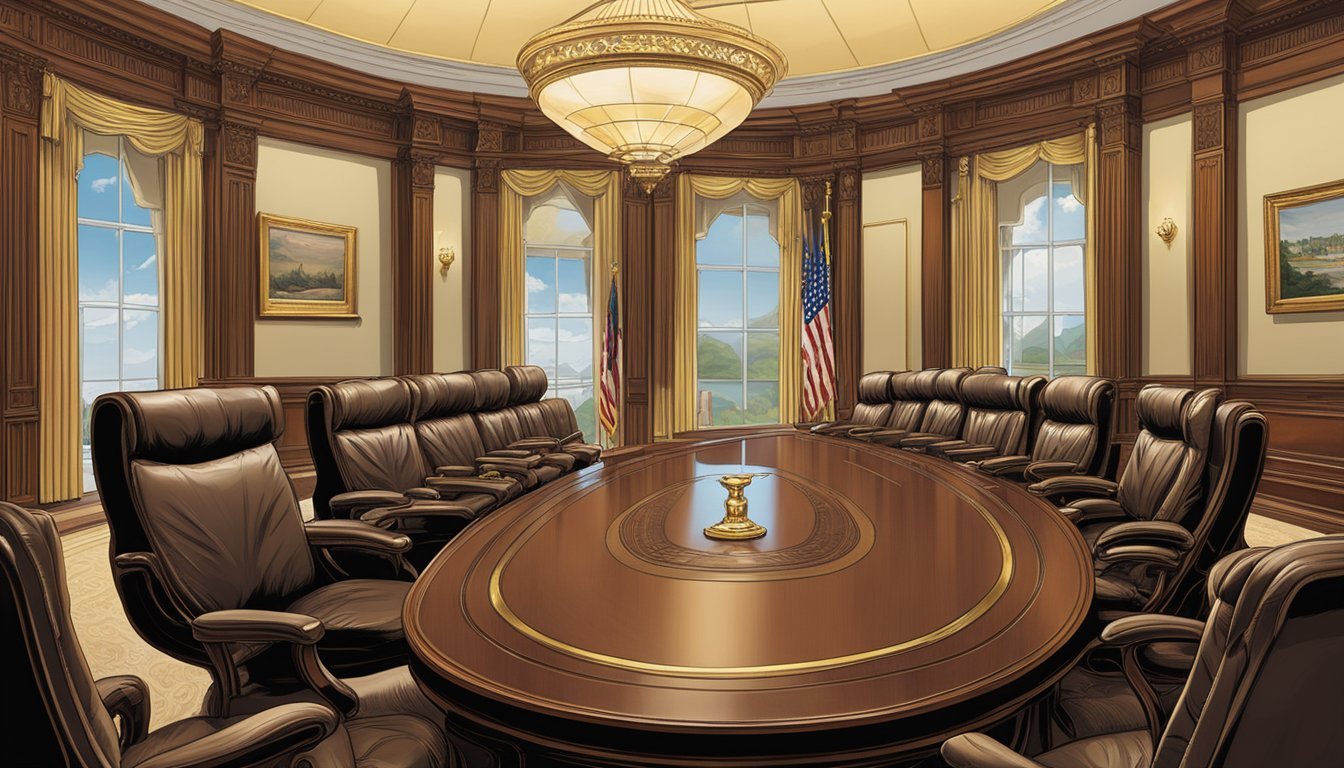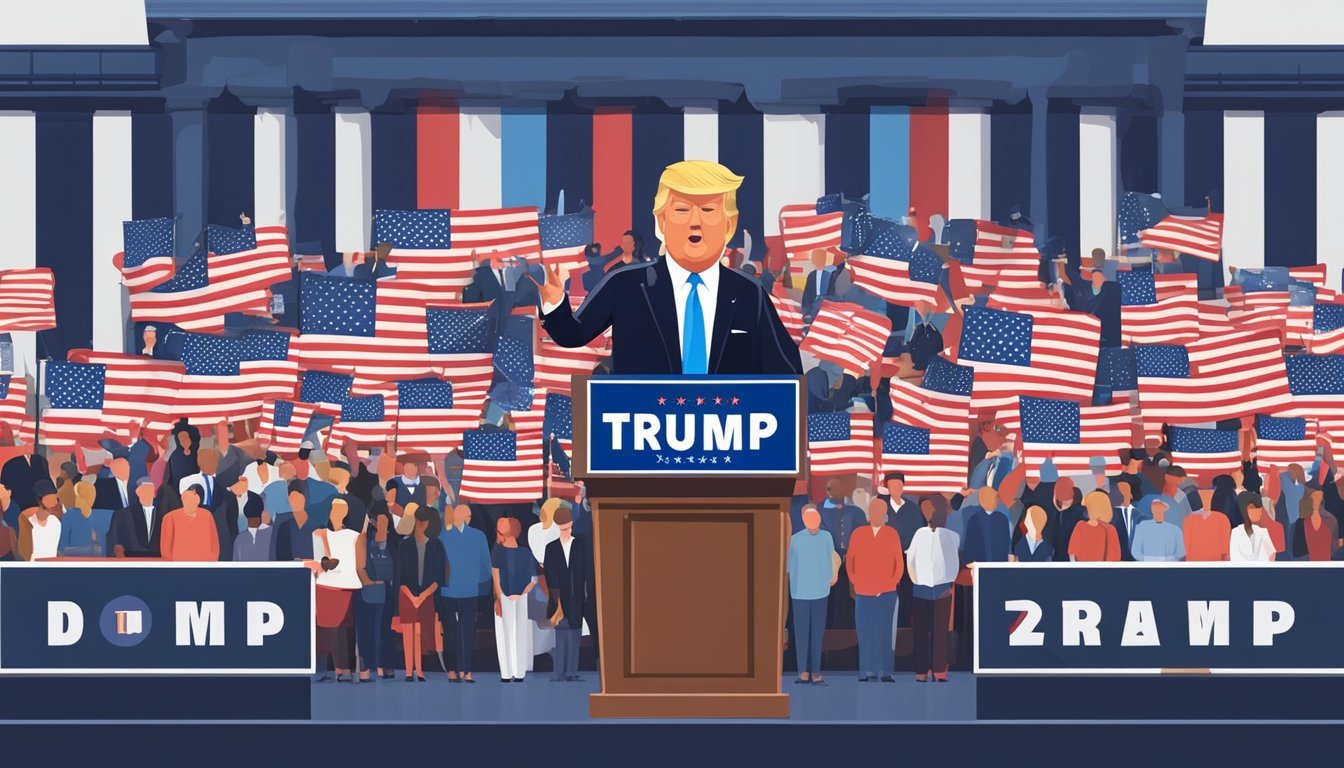Examining the Entrepreneurial Empire of Donald Trump
Evaluating the Former President's Corporate Empire
Donald Trump's business career spans decades, starting at his father's real estate company, which he later renamed the Trump Organization. He expanded operations into Manhattan, leveraging his father's financial backing to secure landmark deals and renovate iconic buildings.
The Trump Organization grew to encompass a diverse portfolio of properties, including hotels, golf resorts, and residential buildings across the globe. Trump's business ventures generated substantial revenue, with reported sales of $446.3 million in 2019, though this figure dropped to $278 million in 2020.
Trump's business practices have faced scrutiny, particularly regarding his tax strategies and expense claims. His transition from businessman to politician marked a significant shift in his career, as he campaigned on his business acumen and wealth as qualifications for the presidency. This blend of business and politics has continued to shape public perception of Trump's role as both a businessman and a political figure.
Early Business Endeavors
Donald Trump's initial forays into the business world were shaped by his father's real estate empire and his own ambitious vision for expanding into Manhattan. He leveraged family connections and resources to make bold moves in property development and acquisitions.
Family Influence and Initial Investments
Fred Trump's successful real estate business in Queens and Brooklyn provided Donald Trump with a strong foundation. In 1968, after graduating from business school, Donald joined Trump Management. He learned the ropes of property management and development in New York's outer boroughs.
Fred Trump's financial backing and political connections proved crucial for Donald's early deals. The young Trump showed a keen interest in expanding beyond the family's traditional focus on middle-class housing. He set his sights on more lucrative opportunities in Manhattan.
Manhattan Developments and Expansions
In the 1970s, Donald Trump made his first major Manhattan moves. He acquired and renovated the Commodore Hotel, transforming it into the Grand Hyatt. This project showcased Trump's ability to negotiate complex deals and revitalize struggling properties.
Trump's most iconic early development was Trump Tower, completed in 1983. The 58-story skyscraper on Fifth Avenue became a symbol of luxury and Trump's growing brand. It housed both high-end retail spaces and lavish residences.
These Manhattan projects established Trump as a major player in New York real estate. He gained a reputation for ambitious developments and a flair for self-promotion, traits that would define his future business ventures.
Growth of The Trump Organization
The Trump Organization expanded rapidly from its roots in New York real estate to encompass a diverse portfolio of businesses across multiple industries. This growth strategy focused on high-profile acquisitions and leveraging the Trump brand name.
Expansion into Casino and Hotel Industries
Donald Trump entered the casino business in the 1980s, acquiring properties in Atlantic City. He purchased the Taj Mahal in 1988, which became the Trump Taj Mahal. The Trump Plaza and Trump Castle casinos followed soon after.
In the hotel sector, Trump developed luxury properties like the Trump International Hotel in Las Vegas. He also acquired and renovated existing hotels, including the historic Mar-a-Lago estate in Palm Beach, Florida, which he converted into a private club.
The organization expanded its hospitality portfolio with golf courses across the United States and internationally. Notable acquisitions included Turnberry in Scotland and Doral in Miami.
Diversification into Entertainment and Lifestyle Brands
Trump leveraged his public persona to branch into entertainment and consumer products. He produced and starred in the reality TV show "The Apprentice," which ran for 14 seasons.
The company launched various Trump-branded products:
Trump Steaks
Trump Vodka
Trump Magazine
Trump University (later closed amid controversy)
These ventures aimed to capitalize on the Trump name, though many were short-lived or faced challenges.
Trump Mortgage was established in 2006 but ceased operations in 2007 due to the housing market downturn.
Real Estate and Commercial Ventures
The Trump Organization continued to focus on real estate development and acquisitions. Key properties included:
40 Wall Street in New York City
Trump International Hotel & Tower in Chicago
Trump Winery in Virginia
Commercial ventures extended to managing public spaces. In 1986, Trump took over the renovation of Wollman Rink in Central Park, completing the project under budget and ahead of schedule.
The company expanded through licensing deals, allowing developers to use the Trump name on their projects for a fee. This approach enabled brand growth with minimal financial risk to the organization.
Media Ventures and Public Persona
Donald Trump's foray into media and entertainment significantly shaped his public image. His ventures in television and social media platforms amplified his visibility and influence beyond the business world.
The Apprentice and its Impact
"The Apprentice" catapulted Donald Trump to new heights of fame. The reality TV show, which premiered in 2004, featured Trump as a tough, no-nonsense boss evaluating aspiring entrepreneurs. It drew millions of viewers and ran for 14 seasons.
The show's catchphrase "You're fired!" became synonymous with Trump's persona. It reinforced his image as a decisive and successful businessman. "The Apprentice" also introduced Trump to a broader audience, particularly younger viewers.
The success of the show led to spin-offs like "The Celebrity Apprentice." These iterations further cemented Trump's status as a pop culture icon. His appearances on the show highlighted his connections with celebrities and influential figures.
"The Apprentice" played a crucial role in building Trump's brand. It portrayed him as a mentor and deal-maker, traits he later emphasized in his political career. The show's impact extended beyond entertainment, influencing public perception of Trump's leadership abilities.
Challenges and Setbacks
Donald Trump's business career has been marked by significant obstacles and controversies. Financial struggles, legal battles, and intense public scrutiny have all impacted his various ventures over the decades.
Bankruptcies and Debt Management
Trump's businesses have faced multiple bankruptcies, particularly in the casino industry. His Atlantic City properties, including Trump Taj Mahal, Trump Plaza, and Trump Castle, filed for Chapter 11 bankruptcy protection in the 1990s and early 2000s.
Trump Entertainment Resorts, which operated these casinos, went through bankruptcy proceedings in 2004, 2009, and 2014. These financial setbacks resulted in significant debt restructuring and losses for investors.
Despite the bankruptcies, Trump maintained that he used the law strategically to benefit his business interests. However, these events raised questions about his financial acumen and business practices.
Legal Disputes and Civil Lawsuits
Trump and his organizations have been involved in numerous legal disputes over the years. In 1973, the Justice Department sued Trump Management for alleged violations of the Fair Housing Act, which was settled without admission of wrongdoing.
More recently, Trump faced a civil lawsuit from the New York Attorney General's office. The suit alleged fraudulent business practices, including manipulating asset valuations for financial gain.
Other legal challenges included a defamation lawsuit by writer E. Jean Carroll and investigations into hush money payments to Stormy Daniels. These cases have led to ongoing legal battles and public relations challenges for Trump and his businesses.
Scrutiny During and After the Presidency
Trump's presidency brought unprecedented scrutiny to his business dealings. Concerns about potential conflicts of interest and violations of the Emoluments Clause were raised throughout his term.
The Trump Organization faced investigations into its financial practices, including allegations of tax fraud and insurance fraud. In 2022, the company was found guilty on 17 felony counts related to tax fraud.
Post-presidency, Trump's businesses continued to face challenges. Some properties, like Trump Tower, experienced declining occupancy rates and reduced brand value. His social media venture, Truth Social, also faced financial and regulatory hurdles.
These ongoing investigations and legal battles have posed significant challenges to Trump's business empire and personal brand, potentially impacting future ventures and partnerships.
Financial Performance and Disclosures
Donald Trump's financial picture has been a subject of intense scrutiny and debate. His business dealings, revenue sources, and net worth estimates have fluctuated over time, while questions around tax records and financial transparency persist.
Revenue and Net Worth Assessments
Trump's revenue streams have included real estate, licensing deals, and entertainment ventures. His 2024 financial disclosure revealed millions made from licensing agreements and book royalties. The number of his business holdings reportedly doubled since leaving the White House.
Forbes has regularly assessed Trump's net worth, with estimates varying significantly over the years. Deutsche Bank, a major lender to Trump's businesses, has played a key role in financing his ventures.
Trump's actual net worth remains contested, with his own claims often differing from external estimates. Financial disclosures have provided some insight, but the full extent of his wealth and business performance remains unclear.
Tax Records and Financial Transparency
Trump's tax returns and financial transparency have been contentious issues. Unlike previous presidents, he did not voluntarily release his tax returns while in office. This led to legal battles and investigations seeking access to these records.
The New York Times reported that Trump paid $750 in federal income taxes in 2016 and 2017, based on obtained tax records. This revelation sparked debates about his tax strategies and overall financial picture.
Financial disclosures required for his presidential campaigns have offered glimpses into his business interests. However, these forms provide limited detail compared to full tax returns.
Questions persist about potential conflicts of interest between Trump's business empire and his political career. The full scope of his financial dealings remains a topic of ongoing investigation and public interest.
Political Involvement and Impact
Donald Trump's business background significantly shaped his political career and presidency. His commercial interests became intertwined with his role as a public servant, raising unprecedented questions about conflicts of interest.
Presidential Campaign and Business Interests
Trump launched his 2016 presidential campaign as a political outsider, leveraging his business experience as a key selling point. He portrayed himself as a successful dealmaker who could apply his business acumen to government. Trump's campaign rallies often doubled as promotional events for his properties, blurring the lines between politics and business.
The Trump Organization, his family's real estate and branding empire, became a focal point of scrutiny. Critics argued that Trump's business ties could influence his policy decisions and foreign relations. Despite calls to divest, Trump maintained ownership of his businesses while in office.
Conflicts of Interest and Trump Presidency
As President, Trump faced ongoing criticism for potential conflicts between his official duties and business interests. He broke with tradition by not placing his assets in a blind trust. Instead, Trump transferred management of the Trump Organization to his adult sons.
The Emoluments Clause of the Constitution, which prohibits presidents from accepting gifts or payments from foreign governments, came under intense focus. Trump's hotels and properties, particularly those frequented by foreign officials, raised concerns about improper influence.
Critics argued that Trump's business dealings could compromise national security and foreign policy decisions. Supporters countered that his business experience was an asset to his presidency. The debate over Trump's business entanglements continues to shape discussions about ethics in government.
Charitable Activities and Philanthropy
Donald Trump's charitable activities have faced scrutiny over the years. The Trump Foundation, established in 1988, was his primary vehicle for philanthropic efforts.
The foundation received donations from various sources, including Trump himself. It distributed funds to numerous causes and organizations.
However, investigations revealed irregularities in the foundation's operations. Questions arose about the use of funds for personal and political purposes.
In 2018, the Trump Foundation agreed to dissolve under judicial supervision. This decision came amid allegations of improper use of charitable assets.
Trump's personal charitable giving has also been examined. Tax records showed substantial deductions for charitable contributions.
Some of these contributions took the form of conservation easements on Trump-owned properties. Others included in-kind donations from his businesses, such as free rounds of golf.
Critics argue that Trump's charitable activities often aligned with his business interests. Supporters maintain that he has made significant contributions to various causes.
The full extent of Trump's personal philanthropy remains a topic of debate. Public records and investigations have provided some insights, but uncertainties persist.






